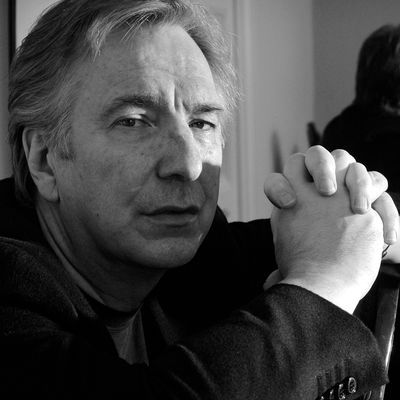
In his most Alan Rickman–ish roles, Alan Rickman didn’t so much say his lines as drop them, a syllable at a time, from on high, sometimes wearily (as if they were too heavy to fling), sometimes as a show of power — always with as much import in the pauses as in the words themselves. Sometimes, too, the delivery was shtick, but it expressed a guarded, deliberate approach to the world that seemed genuine. When we saw the origins of Severus Snape’s simultaneous disdain for and loyalty to Harry Potter (Snape had been in love with Harry’s mother), it made sense: Behind the façade was a vulnerable child.
I heard that about Rickman in life, too: He was chill, he was bitchy, and then, suddenly, he was tremulously open and even dear. Someone I know on a remote, uncomfortable shoot said he started off complaining but by the final days was hugging people and saying, “Oh, what am I going to do without my family???”
Along with many lucky Americans, I saw him first on Broadway in the early ‘80s in Christopher Hampton’s adaptation of Les Liaisons Dangereuses as the Vicomte de Valmont to Lindsay Duncan’s Marquise de Merteuil. Nowadays we wouldn’t think of him as an accomplished, Machiavellian seducer, but he was mesmerizing. He prowled the stage purposefully, then swiveled around and channeled the full force of his persuasion (was it charm? of a sort) onto his unlucky prey. Undone by his own humanity, his Valmont stood before us naked in his grief, with no resources to console himself. He and Duncan were one of the greatest stage teams I’ve seen — there was even an erotic spark, rare in Rickman’s work.
The producer Joel Silver saw the same production and cast him in Die Hard as the master thief posing as a terrorist, Hans Gruber, the role that made him a movie star — or, really, a movie-star villain. The joke, of course, is in how icily Rickman underplays, firing a bullet into an executive’s head with a matter-of-fact shrug, un-bruised by sympathy of any kind, only seeming to realize as he falls in slow motion to his death that what beat him wasn’t so much John McClane’s macho heroism as McClane’s emotion.
Many of the roles that followed — the Sheriff of Nottingham, the psychotic land baron in the underrated Quigley Down Under — were variations on Gruber. Even Snape seemed to have the same ice water in his veins, though by the end Rickman was stretching out the pauses between syllables to the point where you wondered how his co-stars could keep a straight face. But finally, by the last installment, we understood something else: that those pauses also conveyed a soul in torment.
The glints — or sudden floods — of vulnerability weren’t the best parts of Rickman’s performances, but they were what most of them built toward: a colonel finally yielding to love in Sense and Sensibility, an actor fed up with a role as an alien finally yielding to it, furiously, to avenge a fallen fan in the delicious sci-fi comedy Galaxy Quest.
I wish I’d seen more of his stage work, although one of my biggest disappointments in the theater was his performance in the title role of Ibsen’s John Gabriel Borkman: He didn’t have the size, the stature, to play a fallen industrial giant, a lion in winter. He’d held back so much for so long that he made the character seem small and fussy. But the sole play I saw him direct was a triumph. His production of Strindberg’s The Creditors (in which he didn’t appear) wasn’t so much tight as coiled. Rickman measured every tiny beat along the way to the climactic inferno, which seemed truly, tragically inexorable.
If he played any gay parts, I missed them. I’d really like to have seen him in a gay love story — something that cut deep. But my favorite of his performances was a romantic one, in Anthony Minghella’s 1990 goofy, wrenching, irreducible masterpiece, Truly, Madly, Deeply. Rickman plays the ghost of (the marvelous) Juliet Stevenson’s lover, Jamie, a cellist whose sudden death left her with a seemingly un-fillable hole. Rickman’s iciness has never been so tantalizing: His Jamie is all there but somehow … not, with one foot in the other world, his cello singing in a way he can’t. But Rickman suggests so many other things at once: longing, petulance, and the capacity for abandonment. I’d like to think he still had that capacity in him.
As we’ve seen earlier this week, 69 is a horrible age to lose an artist who’s still searching, still vital. The tender epitaph eludes me. I hate that he’s gone.


